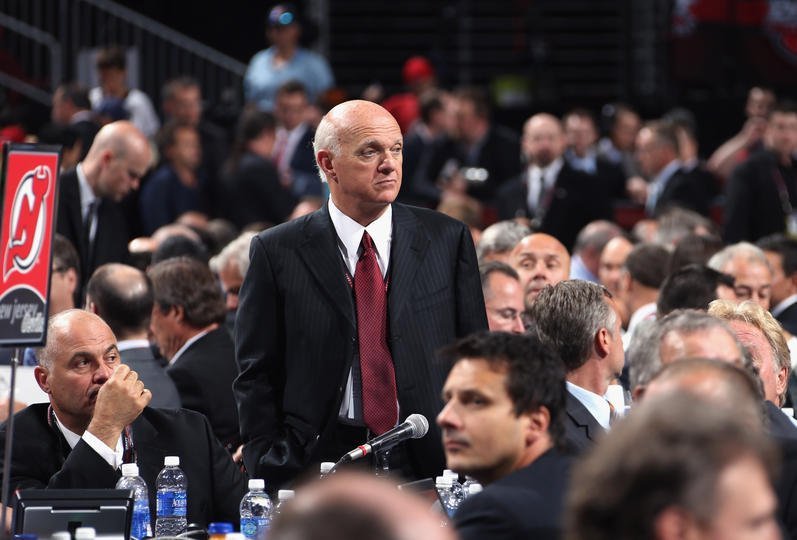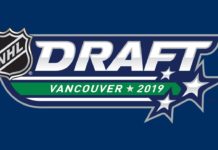Writing on the topic of salary negotiation between agents and clubs back in 1993, then-GM of the Hartford Whaler sand disciple of Lou Lamoriello, Brian Burke, had this to say in an article for the Marquette Law Review:
“A huge problem has developed in recent years with regard to player contract negotiations. With the onset of collectively bargained salary systems, there is an incentive for general managers to work with agents to circumvent the confines of those systems… In two sports you have a salary cap, and several instances of agents and general managers circumventing the salary cap have occurred. This is just the tip of the iceberg. There will be more of these cases, and there is going to be arbitration and litigation on just these issues. In my opinion, a general manager has no right to circumvent the collective bargaining agreement. Given a choice between losing within the rules and winning with some blurring of the lines, many general managers will not remain within the cap… If the general manager is allowed to be creative and circumvent the system, then the system is useless.”
While most people are likely unaware of the article, Burke’s position on cap-circumventing contracts comes as no surprise to Leafs fans who bore witness to Burke’s complete opposition to these contracts during his time at the helm of the Toronto Maple Leafs. While Burke’s scruples are admirable, he drew the ire of some Leafs fans for constraining the club and not leveraging its considerable financial resources to attract top talent by signing “retirement contracts.”
Fast-forward 17 years (coincidentally) to 2010 and Burke’s words couldn’t have proven more prophetic as his mentor and friend Lamoriello attempted to sign Ilya Kovalchuk to a 17-year, $102 million dollar contract, which the NHL subsequently rejected on July 20th, 2010 as a violation of Articles 11.6, 26 and 50 of the 2004-2005 Collective Bargaining Agreement (“CBA”). The contract would have paid Kovalchuk 97% of his salary by the end of the 11th year of the contract, and he would have been faced with the prospect of playing out another 6 years for only the remaining 3%.
The issue ultimately ended up in front of System Arbitrator Richard Bloch, who concluded that the contract violated the intent and spirit of the CBA and upheld the NHL’s rejection of it. As a result of the Bloch ruling, the New Jersey Devils were penalized a third round draft pick in 2011, a first round draft pick in one of 2011, 2012, 2013 or 2014 (at the Devils’ option) and $3 million.
Kovalchuk’s contract was by no means the only back-diving “retirement contract” of its kind, with others including Pronger’s, Luongo’s, Kiprusoff’s, Marian Hossa’s, and Marc Savard’s, but it was the most flagrant. After the Bloch ruling, the NHL quickly mobilized to amend article 50.5 to change the way that average salary was calculated in order to close the “retirement contract” loophole. With that, the NHL had finally taken a hard-line approach and seemed determined to fix a system that had become (to use Burke’s words) “useless.” Further revisions were made to Article 50 in the 2012-2013 CBA, with player contracts no longer able to exceed 7 years (8 if a player is resigned by his existing club) and with contracts no longer able to contain a single year salary figure that is less than 50% of the highest single year salary paid during that same contract. With that, the back-diving “retirement contract” is no more.
Fast forward nearly four more years, and on Thursday of last week the NHL quietly announced that it would be reducing the penalty levied against the New Jersey Devils.
In a surprisingly limited press release, the NHL simply stated that:
[quote_box_center]
“NEW YORK — The National Hockey League announced today that it has decided to modify the disciplinary sanctions originally imposed on the New Jersey Devils‘ franchise for its conduct in connection with the signing of former NHL Player Ilya Kovalchuk in July 2010, which conduct was determined by an Impartial Arbitrator to have constituted a circumvention of the NHL/NHLPA Collective Bargaining Agreement (the “CBA”) then in effect.
The sanctions originally imposed on the Club included a significant fine, the forfeiture of the Club’s third-round draft selection in 2011 (which was forfeited) and the forfeiture of a first-round draft selection which has been deferred by the Club until this year in accordance with the terms of the original penalty. As a result, as it relates to the portion of the discipline relating to the first-round draft pick, the Devils stand to forfeit it entirely in the upcoming 2014 NHL Draft. The Devils recently applied to the League for reconsideration and relief from a portion of the original penalty, citing primarily changes in circumstances which, in the Club’s view, changed the appropriateness of the sanctions initially imposed. After due and thorough consideration, the League has decided that a modification of the original circumvention penalty associated with the Kovalchuk contract is warranted and, accordingly, has amended the sanctions as follows:
The New Jersey Devils will now be entitled to the 30th selection overall in the 2014 NHL Draft (the last pick in the first round), regardless of the Devils’ final standing following the 2013/14 season.
The Club will not be permitted to trade or transfer its right to the 30th overall selection in the 2014 NHL Draft.
The Club’s fine has been partially reduced.
The League intends to have no further comment on this matter.”
[/quote_box_center]
In addition to the return of a first round draft pick, it has also been reported that the New Jersey Devils will be returned $1.5 million of the $3 million fine that was originally paid to the League.
As the NHL has indicated that it will have “no further comment on this matter,” it’s impossible to know exactly what prompted this move, which is sure to invite speculation. As an aside, for those of you who do not read the CBA for fun (as I do), I can tell you that after a fairly exhaustive search I can’t find any provision in it that would allow an NHL club to apply to the Commissioner’s office for “reconsideration and relief” from a penalty levied for a violation of Articles 26 and/or 50. That being the case, the relief seems to stem from an extraordinary use of the broad league oversight powers conferred upon the Commissioner’s office, and is seemingly beyond the measures expressly provided by the CBA.
Leaving aside the haziness of exactly how the “reconsideration and relief” was granted to the New Jersey Devils, the only justification provided by either the League or Devils is “changes in circumstances” since the penalty was handed out. Changes in circumstances, you say? Well, what we know for sure is that Ilya Kovalchuk no longer plays for the New Jersey Devils after retiring from the NHL last year (only 3 years into his 15 year contract), and that the penalty was levied against former Devils owner Jeffrey Vanderbeek (who was said to be instrumental in putting the contract together in an attempt to draw crowds to the Swamp, despite Lamoriello’s reluctance) and not new owners Joshua Harris and David Blizter.
The conspiracy theorist among us might think that the NHL used usual good soldier Lamoriello’s flagrant transgression as an opportunity to bring about much-needed change to the CBA with an eye toward eventually (and quietly) reducing the penalty levied against his team. The conspiracy theorist might also think that the penalty relief was part of a back-door deal between the League and the new owners back in August in order to incentivize them into purchasing a team that was in serious financial trouble by handing back $1.5 million just a few months later.
While that might make for a juicy story line, especially given Lamoriello’s position as a senior statesman and friend of the League, the simplest and more likely explanation is that the League simply recognized that the original penalty was an especially harsh one given the number of these contracts handed out at the time, and that no other team was penalized at all. On that basis, it doesn’t seem to be in the best interests of a League focused on parity and competitive balance for the Devils (who are arguably a re-building club) to go without yet another draft pick.
Regardless of why the relief was granted, it’s arguably a fair result, especially in light of the fact that Devils originally paid a stiff price to acquire Kovalchuk and ultimately received only 3 years of service before he suddenly and unexpectedly fled to the KHL. Furthermore, the Devils will only be entitled to an immovable 30th overall draft pick, despite currently holding the 11th overall pick if the draft were to occur today. And given Lamoriello’s willingness to (shrewdly) move first round picks to steal acquire top-shelf talent, it seems to me like the Devils are still – albeit much less stiffly – being penalized.
Still, it’s understandably frustrating for Leafs fans to see that, in the end, there was very little consequence to acquiring top-end talent by circumventing the CBA, and absolutely no advantage for doing the “right thing” and being unwilling to sign “retirement contracts.” We’re left to wonder what might have been.














![John Gruden after the Leafs prospects’ 4-1 win over Montreal: “[Vyacheslav Peksa] looked really comfortable in the net… We wouldn’t have won without him” John Gruden, head coach of the Toronto Marlies](https://mapleleafshotstove.com/wp-content/uploads/2025/09/gruden-post-game-sep-14-218x150.jpg)





















